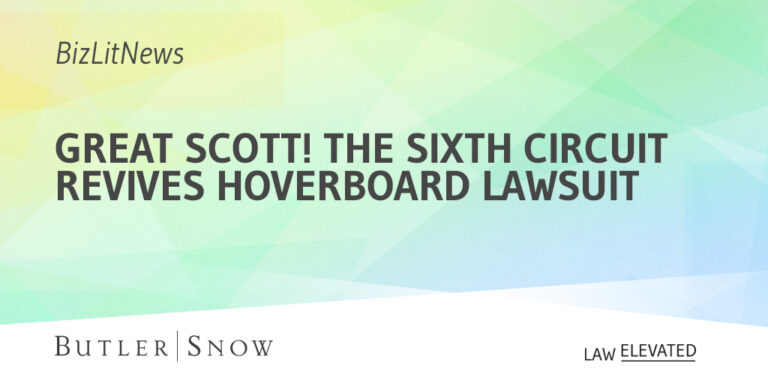The classic 1989 film Back to the Future II famously predicted that humans would be zipping around on hoverboards in the year 2015. The film wasn’t too far off. Hoverboards debuted in the 2000s and gained immense popularity in a short period of time. But even the clairvoyant Dr. Emmett (“Doc”) Brown could not have predicted the potential risks that these hoverboards presented. It turns out that real hoverboards (unlike those used by Marty McFly and Griff Tannen) have a propensity for causing fires and/or explosions. Great Scott!
On November 3, 2015, Megan Fox (not the star of the Transformer films) purchased a hoverboard from amazon.com, Inc. (“Amazon”). Unknown to Fox or her family at the time, Amazon began to develop concerns regarding the potential risks presented by hoverboards. It conducted an internal investigation and discovered at least 17 instances of complaints of fires or explosions involving hoverboards purchased on Amazon’s website. In fact, Amazon’s own product safety manager determined the entire hoverboard product category to be “bad,” causing him to remove his own hoverboard from his home.
On December 11, 2015, Amazon ceased all hoverboard sales worldwide. Amazon also elected to send an email containing a “product safety notification” advising hoverboard purchasers of the potential risks of their lithium-ion batteries. However, the Fox family alleges that the notice omitted some potentially relevant information, including: (1) the Amazon internal investigation of hoverboards; (2) the potential risk posed by the batteries was fire or explosion; and (3) that Amazon elected to cease all hoverboard sales worldwide.
Unfortunately, on January 9, 2016, Fox’s hoverboard caught fire. The Fox family suffered various physical and psychological injuries and lost all of their personal belongings, including their home. They sued Amazon alleging that it (1) sold Ms. Fox a defective or unreasonably dangerous product, in violation of the Tennessee Products Liability Act of 1978, Tenn. Code Ann. § 29-28-101 et seq., (2) breached a duty to warn Ms. Fox about the defective or unreasonably dangerous nature of that product, in violation of Tennessee tort law, and (3) caused Ms. Fox confusion or misunderstanding about the source of that product, in violation of the Tennessee Consumer Protection Act of 1977, Tenn. Code Ann. § 47-18-101 et seq. See Fox v. Amazon.com, Inc., No. 18-5661, 2019 WL 2417391, at *1 (6th Cir. June 10, 2019).
Upon competing motions for summary judgment, the trial court granted Amazon’s and dismissed the Fox family’s claims as a matter of law. The United States Court of Appeals for the Sixth Circuit affirmed in part and reversed in part. The Court recognized that, under Tennessee tort law, a party can assume a duty to act, which can thereafter require that party to act reasonably. On this basis, the Sixth Circuit reversed the trial court and revived the Fox family’s hoverboard claim. The Fox family alleged that Amazon’s election to send the email notification constituted an assumption of the duty to act reasonably with respect to that notification. The Sixth Circuit agreed, holding that the existence of such a duty is a question of law rather than a question of fact. After holding that the duty existed, the Court held that a question of fact existed as to whether Amazon’s failure to include certain information in its notification email amounted to negligence.
Had Amazon simply elected not to send the notification email to Ms. Fox, it likely would have avoided any liability to the Fox family. However, because of its decision to send that “gratuitous” email, Amazon must now show a jury that it acted reasonably in communicating the potential dangers of the hoverboards.
Great Scott! Even Back to the Future director Robert Zemeckis didn’t see this twist coming.
Also significant, the Sixth Circuit appears to have expanded the definition of “seller” under the Tennessee Products Liability Act. According to the Court: “the TPLA’s definition of ‘seller’ means any individual regularly engaged in exercising sufficient control over a product in connection with its sale, lease, or bailment, for livelihood or gain.” Id. at *7. Nevertheless, upon application of the facts to the law, the Court found that the Fox family could not establish that Amazon “exercised sufficient control” over the hoverboard to subject it to liability under the Tennessee Products Liability Act.
Authored by: Kevin C. Baltz
